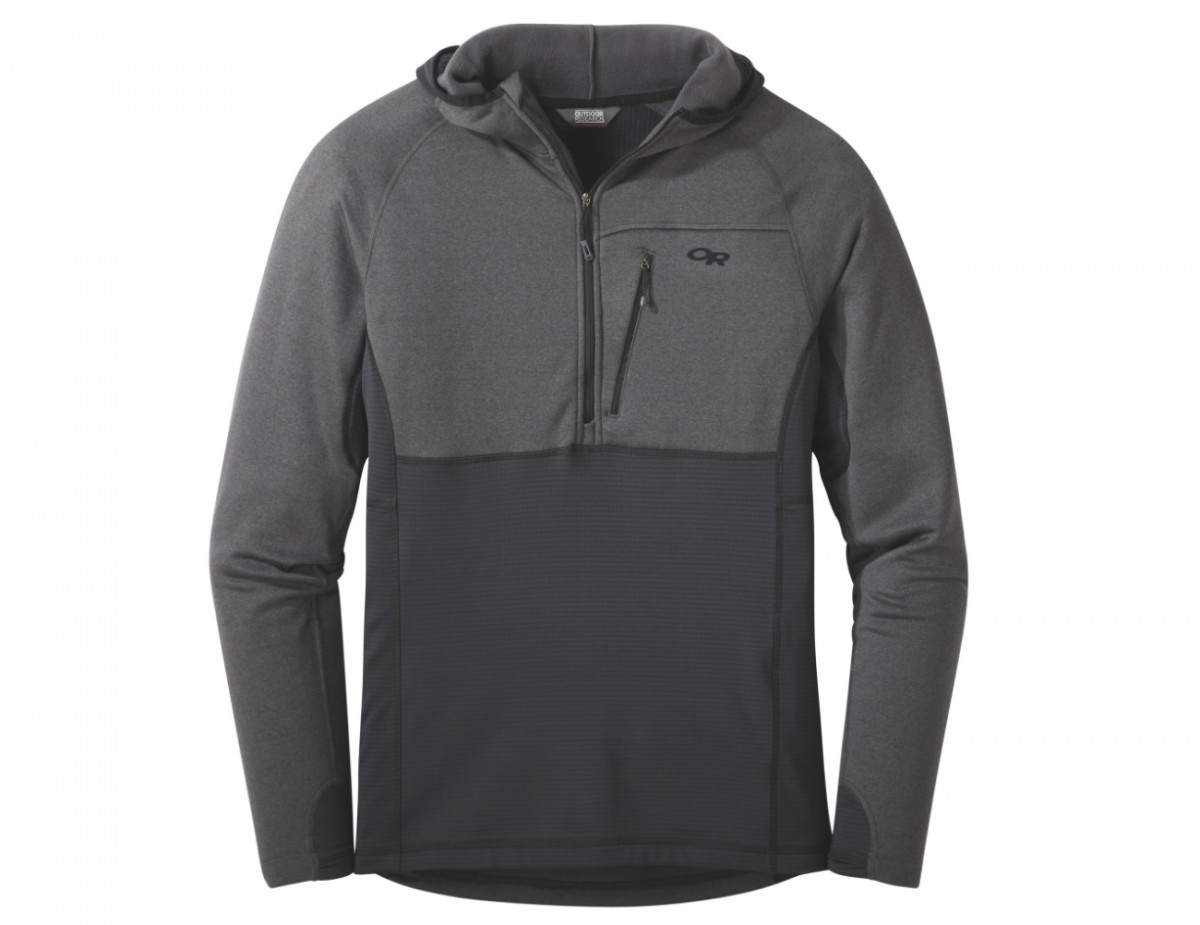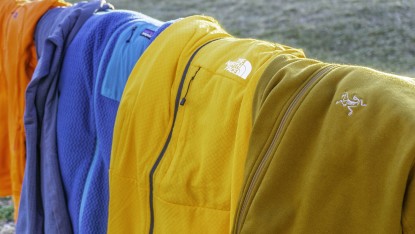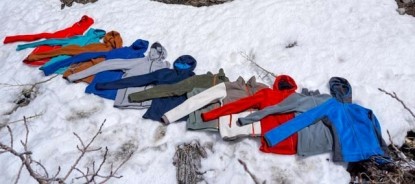Outdoor Research Vigor Half-Zip Hoody Review
Our Verdict
Our Analysis and Test Results
The Outdoor Research Vigor Half Zip is a newer fleece that is going after those who drool over the Patagonia R1 Hoody but can't justify spending the money. This fleece may not perform as well in many ways as the R1, but for the price, it is sure to take some sales away. The Vigor checks almost all of the same boxes and does so at a fraction of the cost. We'll break it all down and see how the Vigor stacks up against the competition.
Warmth
The Vigor is one of the warmest of the half zip, lightweight fleeces in our roundup. Outdoor research utilizes two types of fleece for this layering piece; a standard fleece for maximum warmth and a grid fleece for ventilation in areas you need it most. The standard fleece, used on the sleeves, shoulders, and chest, is pretty thick compared to most comparable half-zips, and the grid fleece panels do a good job of trapping warmth unless a breeze kicks up or you start working up a sweat. This is not intended to be a super warm stand-alone layer, but for a lightweight layer used under a rain or wind shell, this is super toasty.
We loved the scuba-mask style hood for keeping our neck and ears warm. The top of the hood uses the thicker fleece while the panels that cover the ears use the lighter-weight, more breathable grid fleece to let heat escape. The thumb loops do a good job of keeping your wrists covered, adding an extra degree of warmth; however, the half zip closure only comes up to the base of the chin, leaving more of the face exposed in super cold conditions.
Comfort
The Vigor is comfortable, thanks to the soft fleece and thoughtful grid panels that help to reduce bulk around the waist when worn under a shell. This fleece is a true layering piece and has no handwarmer pockets to get in the way under a shell or climbing harness.
Breathability
The Vigor uses two types of fleece to facilitate the maximum amount of breathability where you need it most and loft and warmth everywhere else. The mega breathable grid fleece is located around the waist, armpits, back, and the sides of the hood. The grid fleece is a very light layer that breathes better than any other fleece in our test. This all sounds great, but the problem lies with the regular fleece layer. While it is technically a lightweight fleece, it feels thick in comparison to other similar half zip layering options available and doesn't breathe well enough for our liking.
On really cold, active days, this works pretty well as a stand-alone layer by holding in that heat a little more, but when you start to sweat in this layer, the fleece feels wet, cold and nasty, so layering, or more importantly, de-layering, becomes something you need to pay close attention to.
Layering Ability
The Vigor is intended to be a lightweight inner layering piece. The grid fabric is placed thoughtfully around the waist to reduce bulk where all the layers overlap, but we found the cut slightly boxy and the fleece on the arms and shoulders too thick to layer easily and comfortably under trim fitting shells.
Thumb loops help keep the fleece from riding up your forearm when you slide your arms into a sleeve. We liked to use this fleece on cooler days under a wind shell where a little extra warmth is what you are going for.
Weather Resistance
This is a poor jacket to choose for weather resistance. The grid fleece is so air permeable, it's like it's not even there when the wind picks up, and the thick fleece on the shoulders and chest gets wet and heavy with even the slightest drizzle. Fleece is generally a poor layer for weather resistance, regardless of the kind of fleece. However, some types are worse than others. To make the most of any fleece, a rain or wind shell is crucial.
If you do want something that is more resistant to wind, there are some good options out there, but remember, if you increase the weather resistance of a fleece layer, you, in turn, reduce its breathability.
Weight
The Vigor is a fine lightweight layering piece, but if weight is a primary concern, there are lighter options out there. However, if you are looking for the most warmth for the weight, then this is a top contender. This fleece weighs in at 13.3 ounces for a size large, making it both warmer and lighter than some of its direct competitors.
The short zipper, lack of handwarmer pockets, and the use of the super-thin grid fabric keep the ounces down but had Outdoor Research used a lighter, more breathable fleece for the main body, this would be an even lighter more functional layering piece.
Value
The Outdoor Research Vigor Half-Zip Hoody has, by far, the best bang for your buck. If you are looking for a lightweight layering option that will fit well under a harness or shell, and not break the bank, you should take a good look. With a high warmth to weight ratio, this fleece has commendable performance when layered correctly under the right conditions. With that said, lightweight layering fleeces should be slightly lighter to facilitate better breathability, taking advantage of a shell layer to trap in warmth when needed.
We were disappointed when we realized the fleece around the wrists was pilling after only the 1st couple of days of use. Over the next week, the whole exterior had started pilling, including a spot on our chest, where the sternum strap of our backpack rubbed over the course of a few days. The Vigor has thumb loops, but of the comparable models, these are our least favorite. They work fine for layering up or holding warmth in, but they show a lower level of attention to detail.
Conclusion
When all is said and done, this fleece is a worthy layer for those who need an inexpensive, lightweight fleece. The design is close to ideal. The grid fleece is light and airy, reducing weight, bulk, and packability; the hood wraps and moves freely with the head, and the thumb loops lock in extra warmth and assist layering. The long half-zip can help ventilate when it gets too warm. However, when it's cold out, this fleece is a cozy place to be when under a shell. The pilling we encountered was a shame, but if function, warmth, and/or price is your primary focus, this is one to take a closer look at.













